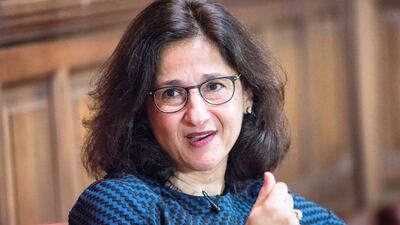Nemat “Minouche” Shafik was the UK's leading official for overseas development when Labour lost power in 2010, and with her deep experience in multilateral lending it was only natural the party would turn to her to restore its priority when the party returned to government this year.
The former president of Columbia University, who resigned on Wednesday, is expected to play a leading role in reshaping one of the pillars of UK foreign policy as she returns to London, where she has spent much of her career.
David Lammy, the Foreign Secretary, stressed the importance of international aid in his policy priorities on taking the job in early July. Injecting new commitments to a global development agenda is central to his promise to bring “progressive realism” into the Foreign Office.
Egypt-born, and raised in exile in the US, Ms Shafik was permanent secretary at the since-abolished Department for International Development (DFID) from March 2008 to March 2011.
Bolstered by a drive to raised British aid spending to 0.7 per cent of national wealth, the department was responsible for all UK development efforts. The bilateral aid programme stretched to more than 100 countries, while multilateral policies and financing for the United Nations and international financial institutions was world-leading.
Boris Johnson as prime minister oversaw post-pandemic cuts to foreign aid as the target was reduced to 0.5 per cent of GDP. Even worse was to come when the government of Rishi Sunak exploited OECD rules to divert money to spending on asylum seekers within the UK. Britain was the biggest recipient of the bilateral component of its foreign aid.
In its manifesto before the July election, Labour said it would go back to the drawing board on foreign aid. It is expected that Ms Shafik's review is one of three full-scale reports that Mr Lammy will commission into policy direction at the outset of his tenure.

“Labour will turn the page to rebuild Britain’s reputation on international development with a new approach based on genuine respect and partnership with the global South to support our common interests,” the manifesto said. “To counter the growing influence of malign actors and boost efforts to combat threats like climate change, the UK’s development work must be closely aligned with our foreign policy aims, co-ordinated to tackle global poverty, instability, and the climate and nature crisis.
“We will renew expertise and focus, especially in priority areas such as supporting economic transformation, tackling unsustainable debt, empowering women and girls, supporting conflict prevention, and unlocking climate finance,” it added.
Experts in the area said the UK could devote resources to the reform agenda to meet commitments to Global South and developing nations for more resources to tackle inequality and climate change. Nilima Gulrajani, a senior research fellow at the Overseas Development Institute, said the structure of how government operates its aid operations in the UK needed a fresh approach. “What really needs looking at is a different kind of development operation that allows the latitude to take the risks that happens when you devolve powers elsewhere and work with a broad range of partners,” she told The National.
“The government should not be afraid to signal to its partners that its official development assistance (ODA) will be spent primarily multilaterally,” wrote Ian Mitchell, a senior policy fellow at the Centre for Global Development. “Although a quantified target for a multilateral share may be too restrictive, they should confirm it will increase significantly from its [current] 36 per cent.”
Before joining DFID in 2004, Ms Shafik was vice president at the World Bank, and afterwards she was deputy managing director of the IMF until taking over as head of the London School of Economics. After seven years there she moved in 2023 to Columbia University.
In leading the review, Ms Shafik is likely to seek to follow something she told an interviewer. “Bad policies tend to get undone eventually,” she said. “That's the democratic process.”
Her family's displacement from Alexandria when the government of Gamal Abdel Nasser embarked on nationalisation has driven her interest in development.
“Policy matters so much,” she told the Financial Times. “One of my first jobs, we were working on how could Egypt ever export fresh fruit and vegetables to Europe. It seemed an impossible problem, because Europeans want their fruit and veg in a certain way, and you needed a cold chain, and you had to deliver in these very specific seasonal windows.”
Years after she noted the contents of her own kitchen showed the value of her early work. “I opened up my fridge, because I was checking if I needed anything from the market. The mangetout and the broccoli had come from Egypt.
“They did it.”
Having argued against cancel culture at LSE, her experience of the US campus demonstrations following the outbreak of war in Gaza has been bruising.
At Columbia protests came to a head when Ms Shafik called in the New York Police Department to remove people who had barricaded themselves inside a campus building.
More than 100 people were arrested on charges ranging from trespassing to burglary, and Ms Shafik faced a torrent of criticism from students and faculty for her response.
In a statement on Wednesday, Columbia University board trustee co-chairs praised Ms Shafik for her tenure and said they “regretfully” accepted her resignation.
“While we are disappointed to see her leave us, we understand and respect her decision,” said co-chairs David Greenwald and Claire Shipman.


